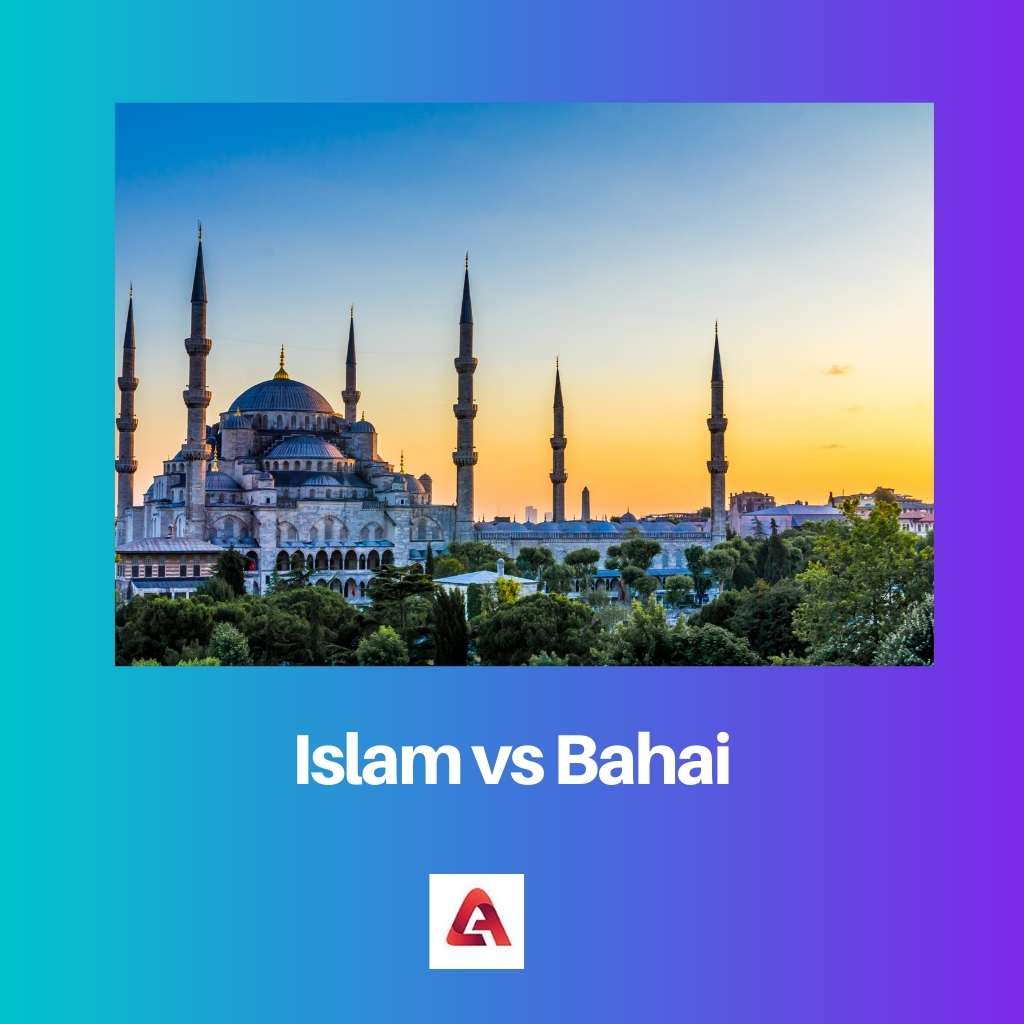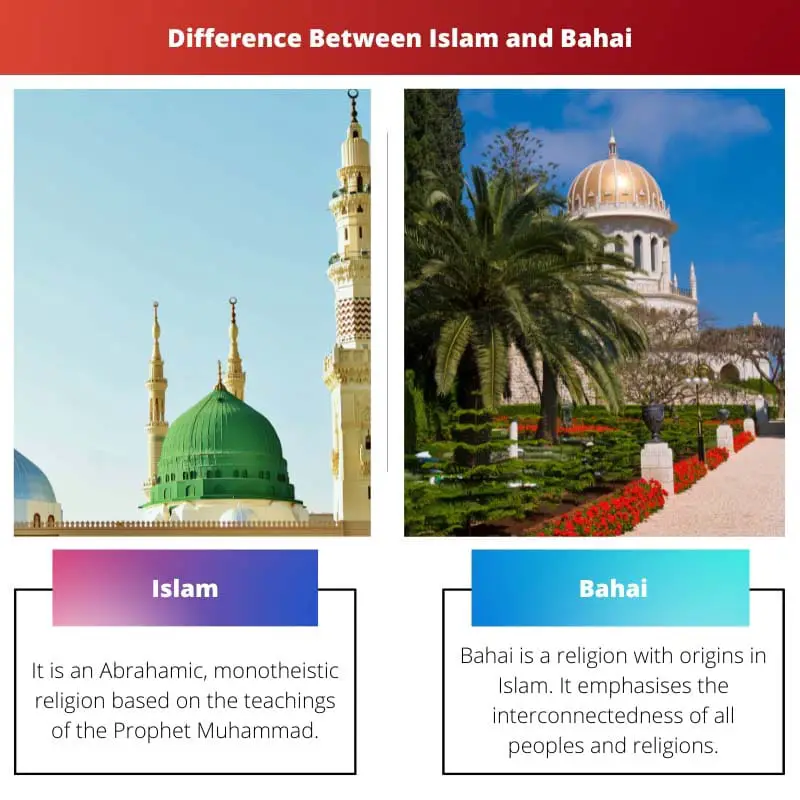Islam is the world’s fastest-growing religion, with approximately 1.8 billion adherents worldwide. Following Christianity, Islam is the globe’s 2nd most prevalent faith.
Bahai is a religion that takes inspiration from Islam and has its roots in the Abrahamic faith. Muslims and Bahais are the two groups of people that follow Islam and Bahai, respectively.
Key Takeaways
- Islam originated in Mecca in the 7th century CE; the Bahá’í faith emerged in the 19th century CE in Persia.
- Muslims recognize Prophet Muhammad as the final messenger, whereas Bahá’ís believe in Bahá’u’lláh as a manifestation of God, succeeding Muhammad.
- The Five Pillars of Islam guide Muslims in their faith; Bahá’ís follow the principles of unity, equality, and progressive revelation.
Islam vs Bahai
Islam is a religion founded in the 7th century in Arabia by the prophet Muhammad, and Muslims believe that there is only one God (Allah). Baha’i, on the other hand, is a religion that originated in Persia in the 19th century. It was founded by Baha’u’llah, who Baha’is believe is a prophet of God.

Islam is a monotheistic faith. Muslims believe in just one all-powerful God.
The Islamic god is called Allah. They embrace a lifestyle completely devoted to their one true god.
The word “Muslim” signifies “submitter.”. They all adhere to the fundamental concepts of Islam’s Five Pillars.
These include obligatory prayers, reciting the shahada, almsgiving, fasting, and pilgrimage.
Bahai is both a religion and science. Bahai followers are more verse as they study their own religion’s scriptures and those of other religions throughout the world.
The core beliefs of this religion are the encouragement of world peace, education for all, gender equality, adoration of one God, and the collusion between science and religion in pursuing veracity.
Comparison Table
| Parameters of Comparisons | Islam | Bahai |
|---|---|---|
| Definition | It is an Abrahamic, monotheistic religion based on the teachings of the Prophet Muhammad. | Bahai is a religion with origins in Islam. It emphasises the interconnectedness of all peoples and religions. |
| Founder | Prophet Muhammed | Sayid Ali Muhammad |
| Holy Book | Quran | Kitab-i- Aqdas |
| Belief | The five pillars are the core benefits and practices of Islam. | Contributing to world peace by establishing unity, fairness, and equality. |
| Famous Festivals | Eid-Ul-Fitr & Eid Al-Adha | Ridvan |
| Holy Sites | Mecca, Medina and Jerusalem | The House of Bahaullah in Baghdad and House in Shiraz, Iran |
What is Islam?
According to Islam, God is benevolent, all-powerful, and unique, and has guided humankind via prophets, disclosed texts, and natural signs.
The Prophet Muhammad had his first religious experience around 610 C.E. when the Angel Gabriel told him to recite. After a time of contemplation and vacillation, the Prophet Muhammad embraced his duty as God’s prophet and taught the word of the one God, or Allah in Arabic.
His wife was his first convert.
The Qur’an is composed of Prophet Muhammad’s divine recitations, which are divided into books (surahs) and verses (ayat). It was originally authored in Arabic.
It is considered to be the exact word of God, as well as the Prophet Muhammad’s teachings and normative examples, which are Islam’s fundamental texts.
The Prophet Muhammad died at Medina in 632 C.E. Muslims believe he was the last prophet in a line that encompassed Moses, Abraham, and Jesus.
The daughter of the Prophet Muhammad married Ali. He was the final Caliph.
Ali was assassinated in 661 C.E. Following this, disagreements arose among Islam’s adherents, prompting them to split into two communities.
Those who felt that Ali should have directly succeeded Prophet Muhammad were known as the Shias, and those who did not believe that Ali should have directly followed Prophet Muhammad were known as Sunnis. It was a significant event in Islam’s history.

What is Bahai?
The Bahai religion was founded by Bahaullah. His prophetic life was spent in exile, culminating in Acre, Israel.
He wrote the Kitab-i-Aqdas there. It is one of the most important Bahai scriptures, as well as for other spiritual works and correspondence.
Bahaullah was followed by Abdu’l-Baha, who spent most of his time, beginning in 1908, spreading Bahai teachings over the world, and the faith quickly established important congregations in Europe and North America.
When Abdul-Baha died in 1921, his eldest grandson, Shoghi Effendi, carried on the faith’s missionary activity and further developed the Bahai philosophy. Shoghi Effendi was also responsible for the establishment or expansion of Bahai shrines and gardens in Israel.
Following Shoghi Effendi’s death in 1957, the faith’s guardianship was transferred to a community of adherents instead of a person, and the Universal House of Justice presently held it.
Now it has distinguished itself as a unique world religion, owing to its 5 million members, worldwide reach (236 countries), independence from its religion of origin, Islam, and for its distinctive doctrines and inclusive belief in one God.
Their doctrines are based on three principles: the unity of God, religious togetherness, and humankind’s togetherness. Bahais believe that God regularly discloses his will through divine prophets, with the goal of transforming humanity’s nature and developing ethical and spiritual characteristics in those who respond.
Religion is therefore viewed as organised, united, and advancing from generation to generation.

Main Differences Between Islam and Bahai
- Islam derives its roots from the Abrahamic faith, while Bahai is a religion that derives its roots from Islam.
- Muslims are adherents of Prophet Muhammad, whereas Bahai are adherents of Baha’u’llah.
- The Quran is the sacred book of Muslims, while the Kitab-i-Aqdas is the holy book of Baha’is.
- Holy Quran as well as the Prophet’s instructions serve as the foundation for Islam’s fundamental concepts. Bahai has a more scientific and modern approach, focusing on problems such as gender equality, world peace, worshipping one God, and merging science and religion.
- Muslims are forbidden from perusing other religious texts. Bahais are allowed to learn their religious texts and those belonging to other religions.
- Muslims pray five times a day, but Bahai only pray twice a day.

- https://www.jstor.org/stable/206100
- https://www.ceeol.com/search/article-detail?id=606442
- https://www.tandfonline.com/doi/pdf/10.1080/03068378608730239
